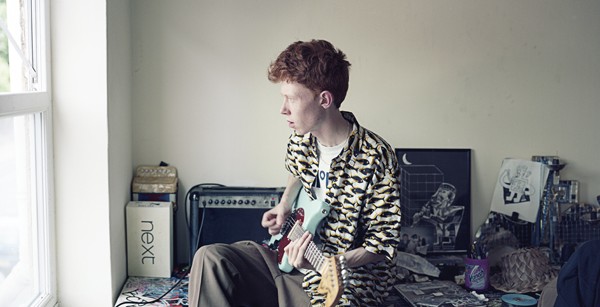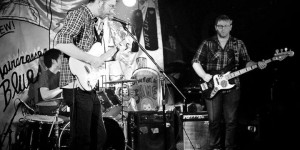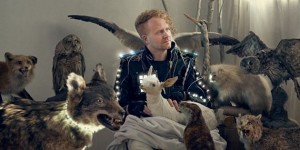 Music
Music
King Krule talks suicidal tendencies and being king
by Jabbari Weekes
October 8, 2013
Burgeoning young artist King Krule talks art, brushes with suicide, and being King.
Pioneered by 20th-century artists like Pablo Picasso and Georges Braque, Cubism consists of breaking objects apart and reassembling them in a fragmented form. Similar traces of the disfigured style can be found in the way 19-year-old UK singer/songwriter Archy Marshall—aka King Krule—arranges his music. Once interested in being a painter himself, Marshall uses a swatch of musical influences from ’50s rock icon Gene Vincent to Afrobeat composer Fela Kuti to add colour to his world-weary lyrics. But it’s Marshall’s wrangling voice that stirs up attention.
After releasing music through Bandcamp under the moniker Zoo Kid, his single “Out Getting Ribs” would be the one to leave critics and peers questioning how a then-16 year old could have such an arresting voice. Three years later, after frenzied blog hype and co-signs from Frank Ocean to Beyoncé, Marshall has finally pieced together his masterstroke in the debut Six Feet Beneath the Moon. Wrapped in blotchy sound textures and off-kilter rhythms, he delivers his signature rugged baritone yowl through emotional lyrics that are just as abstract as the styles he evokes. We spoke with the burgeoning artist about his love of art, brushes with suicide, and being King.
AUX: I wanted to ask you what was the inspiration behind the Six Feet Beneath the Moon cover, because I saw almost some Cubism/Vorticism art style in some of the sketches and styles?
Archy Marshall: It was done by my brother (Jack George Marshall), but it’s essentially like a room. The room is the lampshade sort of the structure of it. I guess there’s a lot of different stuff going on. The original one we did was really, like, complex, with loads of different patterns and lots of different objects in the mix. On the inside sleeve as well there’s photographs, they tell a lot—they got a lot of reference to my growing up, the objects I used for the album, the places I sort of wrote the lyrics, and stuff like that. It’s his interpretation of my music mainly, though.
I think I’m kind of overthinking it, because the songs are supposed to be interpretive, but in songs like “Has This Hit” and “Baby Blue,” there’s this character named Blue that I’m assuming is a girl running throughout the album is that based on a real person?
Yes, it was. It was based on a girl I was trying to get for a long time and then eventually I realized that there was no need to waste [as] much time as I was.
Why did you choose Blue as her name?
It really stemmed from “Baby Blue” and the line “I’ll paint the sky blue, baby blue” and I don’t know, it just always felt right, man. It’s just my favourite colour it’s just the tone of everything I felt at the time.
You’ve said your U.F.O.W.A.V.E EP is really your first. What about it did you hit on in terms of your direction as King Krule?
It was at the end of that mixtape when I was really, really content with my songwriting skills, and I sort of packed everything away and didn’t really want to make music anymore. I just wanted that to sort of exist and for people to discover it and people did. The response that it got really put me back into making music and getting my music out, and letting people hear it was something that really egged me on in the end. So, King Krule came about because it was a fresh start. [First moniker] Zoo Kid wasn’t getting any love from across the world, and all of a sudden a lot of people are now listening to him, so I just wanted to make it a bit more official in a way.
Actually one of your songs, “Cementality, ” has a really bleak outlook on life. Is that something you’re attracted to?
I think “Cementality” is a very, very optimistic outlook on death.
It’s one of the most beautiful things I’ve ever heard about pretty much wanting to end yourself. Is that theme really interesting to you?
I’m not attracted to it. I think I’ve felt it a lot so it’s hard not to escape feeling it. I think with “Cementality,” I spent quite a long period of my life believing that death was the best escape from living. I didn’t want to live anymore, so I think that song really sums up that emotion for me, but yeah, [death] always gets me in the back of my head in some respect.
What brought you to that point, at least for that brief instance?
Well, it wasn’t a brief instance, it was a long period of my life. Being frustrated with the world, where I’m going to go, not having a lot of money to eat, not having enough money to sort of live well, not seeing my mom enough. I don’t know, just feeling very lost, like nobody likes you, nobody loves you, and being alone constantly. Also just the fact that I didn’t want to go outside or leave my bed, I just want to stay in this duvet and jump out a window. I spent so many years of my life like not wanting to leave my bed.
You have a couple songs from your EP on the album and then you have other songs like “The Wake” and “Greyscale” that you’ve left out.
Yeah, in a way, I didn’t want to make a sub list of a record. A few months ago, before the end of the album’s creation, it’s just got so much I’ve been working on for so long so I was just like, fuck it, I have to keep these songs. Even on the last day, I was creating more songs, so the newer songs started to overtake the older songs. It’s interesting that I kept “Easy Easy” on there because it’s a very old song, but it was quite natural so I just let it flow in the end.
I’m curious was there ever a point where your aspirations—I know you talk about it in a lot of your songs, even the concept of the album itself—did you feel like your aspirations were hitting a ceiling, musically or not?
Of course. Like, you say the whole album is themed around that [feeling], especially the title, Six Feet Beneath the Moon. Constantly I was battling with like, walls and ceilings, and I couldn’t escape the fact that I couldn’t see the bigger picture of the album because I was working with the individual tracks for so long. In the end I had to just leave it to a natural sort of flow and just listen to what sounded good as opposed to trying to calculate a narrative. I had to let it be something I enjoyed listening to.
Let’s imagine that your listeners are your followers. What type of king do you think you would be?
I wouldn’t be a king, man.
You don’t think so?
I wouldn’t be a king. I wouldn’t be a leader. I’m a people person. I would unite them.
Not even in the realm of music?
It’s really interesting because there is—I feel it now, like I have a lot more power than I used to, in a way, but I do want to reach the top, and I want to see how things land, and I do want to get to the top and change things, but I’m not sure about being a leader.
Aside from music, from what you’ve read and seen, what do you think about power that corrupts people?
Yeah I mean, in correlation to history, any dictator or any leader that has an ultimate form of power—like a despot over everything as soon as they reach that, things are not fair in a way. I don’t know, it’s hard for me because I’m developing my thoughts and processes. Like, I use to really be into Marxism and into Anarcho-syndicalism and different ideas about those sort of far left-wing ideas. I guess the more I’ve grown old and the more knowledge I’ve gotten, and the more stories I’ve read about leaders and history it’s just confused me even more. So I’m constantly developing.

This article originally appeared in the October 2013 Issue of AUX Magazine.
Download and subscribe for free in the app store.





